News
Open Source Kotlin Continues to Climb
- By David Ramel
- June 25, 2019
Kotlin is continuing its "meteoric" rise in the software development world, with recent research providing new insights into its increasing popularity.
Coming from JetBrains, the creator of Kotlin, the research provides a unique perspective into its use, though the Kotlin section was but a small part of the wide-ranging, global "Developer Ecosystem Survey 2019" report that contains data garnered from nearly 7,000 developers in 17 countries.
Kotlin first appeared in 2011, and since then has gained in popularity, making it the fourth "most-loved" programming language in yet another huge developer survey, the "Stack Overflow Developer Survey 2019," as shown in this graphic:
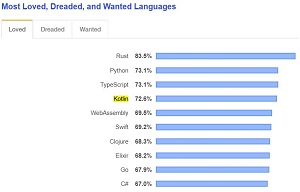 [Click on image for larger view.]
Most Loved Programming Languages (source: Stack Overflow)
[Click on image for larger view.]
Most Loved Programming Languages (source: Stack Overflow)
Just last month, Google named Kotlin the No. 1 option for Android development, surpassing the ubiquitous Java.
Google's developer documentation describes Kotlin thusly:
Kotlin is an open-source, statically-typed programming language that supports both object-oriented and functional programming. Kotlin provides similar syntax and concepts from other languages, including C#, Java, and Scala, among many others. Kotlin does not aim to be unique—instead, it draws inspiration from decades of language development. It exists in variants that target the JVM (Kotlin/JVM), JavaScript (Kotlin/JS), and native code (Kotlin/Native).
And, indeed, the latest JetBrains research shows Android is the most popular target among Kotlin developers, edging out the Java Virtual Machine (JVM):
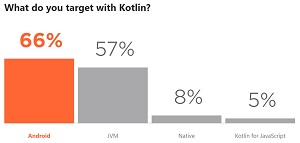 [Click on image for larger view.]
Kotlin Targets (source: JetBrains)
[Click on image for larger view.]
Kotlin Targets (source: JetBrains)
Note that Kotlin/Native, though just introduced, is already targeted by 8 percent of respondents.
"Kotlin/Native is a technology for compiling Kotlin code to native binaries, which can run without a virtual machine," the Kotlin site says. "It is an LLVM based backend for the Kotlin compiler and native implementation of the Kotlin standard library."
For those developers targeting the JVM, 80 percent report targeting JDK 8, though the Java Development Kit has already hit version 11, targeted by 25 percent of respondents.
Those targeting Android are also slightly behind, with 79 percent targeting Android 8.0-8.1 Oreo, followed by 74 percent targeting Android 9.0 Pie.
Kotlin/Native developers, meanwhile, target:
- Linux (74 percent)
- Android, (48 percent)
- MacOS (47 percent)
- Windows (45 percent)
- iOS (28 percent)
- WebAssembly (25 percent)
- Embedded (7 percent)
"Kotlin/Native allows you to write cross-platform code. Opening the way to IoT for Kotlin developers," the JetBrains report said.
As far as what types of apps are developed in the Kotlin camp, mobile apps have a strong lead over Web back-end projects:
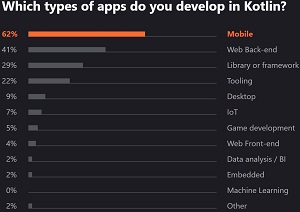 [Click on image for larger view.]
Kotlin App Types (source: JetBrains)
[Click on image for larger view.]
Kotlin App Types (source: JetBrains)
Unsurprisingly, the top "other programming language" used by Kotlin developers is Java, reported by 86 percent of respondents to the JetBrains survey, followed by:
- JavaScript (60 percent)
- SQL (48 percent)
- HTML/CSS (46 percent)
- Python (44 percent)
- TypeScript (28 percent)
- Go (23 percent)
- Swift (19 percent)
- C (18 percent)
- C++ (18 percent)
- Groovy (17 percent)
- PHP (16 percent)
"Almost all Kotlin developers (92 percent) were using Java before they started using Kotlin," JetBrains said. "Most of them (86 percent of all Kotlin users) still continue to use Java."
Other highlights of the JetBrains survey include:
- 27 percent of Kotlin developers reported they had been using the language for less than six months
- 87 percent of JavaScript development targets the server side, with 51 percent targeting the client side
- Kotlin is used mainly for new projects (96 percent), and only 38 percent use it for pre-existing projects
- 76 percent use Kotlin for work, 69 percent for personal/side projects
- More than a third of developers are migrating their existing projects to Kotlin
JetBrains targeted Kotlin developers exclusively in prior research, the "Kotlin Census 2018," which polled some 4,000 developers (not just Kotlin users) between December 2018 and March 2019.
"Designed and developed by JetBrains, Kotlin has seen significant growth and support from tech giants and developers," that report states. "2016 saw the release of Kotlin 1.0. Then in 2017, Google announced Kotlin as a first-class language for Android. In 2018, the language had already reached 1.5M+ users and had over 96,000 repositories on GitHub."
Today, over 70 members of the core Kotlin development team and more than 250 amazing contributors drive the language and ecosystem growth."
Highlights from that report include:
- 58 percent of respondents use Kotlin in production code, up from 55 percent in 2017
- Lack of knowledge was the No. 1 factor keeping developers from using Kotlin, reported by 55 percent of developers. Some 18 percent reported "low adoption of the language.
- Kotlin/JVM was the No. 1 flavor of Kotlin being used, reported by 67 percent of respondents, followed by Android (57 percent) and JavaScript (8 percent)
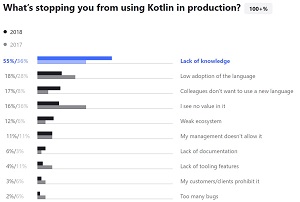 [Click on image for larger view.]
Kotlin Impediments (source: JetBrains)
[Click on image for larger view.]
Kotlin Impediments (source: JetBrains)
Technical careers site Dice.com also took a look at the JetBrains report in a recent blog post -- "Kotlin: How (and Why) Tech Professionals Use It" -- providing some of its own data backing what it called a "meteoric rise over the past few years."
The Dice report states: "In late 2018, an analysis of Dice data found that the number of job postings mentioning 'Kotlin' had skyrocketed since the second quarter of 2017, which roughly corresponds with Google announcing (at its I/O 2017 conference) that Kotlin was officially a 'first class' language for Android:
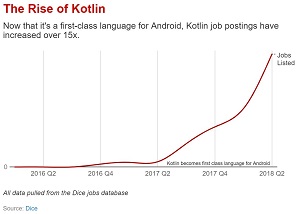 [Click on image for larger view.]
The Rise of Kotlin (source: Dice)
[Click on image for larger view.]
The Rise of Kotlin (source: Dice)
"So where does the language go from here?" Dice wondered in its conclusion. "It will likely continue to grow -- which means you should at least become familiar with it, especially if you build mobile apps and/or work with Java."
About the Author
David Ramel is an editor and writer at Converge 360.